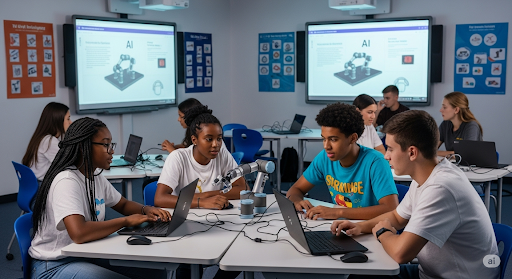
Saudi Arabia is set to introduce a comprehensive AI curriculum across all public schools, starting in the 2025-2026 academic year. This initiative is a key part of Vision 2030, aimed at equipping students with digital skills, ethical awareness, and innovation capacity. A pilot program involving over 50,000 students has already been conducted.
Overview of the AI Curriculum Integration
In a landmark move aligned with Vision 2030 goals, Saudi Arabia will integrate artificial intelligence education at all public school levels from 2025. The curriculum, developed by various institutions, focuses on building progressive AI literacy from early primary stages to secondary education. It is designed to provide foundational digital skills, ethical awareness, and innovation capacity to the younger generation.
The AI Curriculum Structure
The AI curriculum will span different school cycles:
- Primary (Grades 1–3): Interactive stories and games for basic technology and AI concepts introduction.
- Middle School: Digital thinking, algorithm awareness, human vs. machine decision-making comparison.
- High School: Command engineering, ethical AI design, bias evaluation, problem-solving simulations.
The curriculum covers AI ethics, policy, and technical concepts like data analysis and algorithms, ensuring seamless integration into the existing educational framework.
Empowering Future Generations
By introducing AI literacy in schools, Saudi Arabia is preparing its youth for the digital workforce in high-growth sectors. This move aims to bridge the skills gap in areas like AI, data science, and innovation, supporting Vision 2030’s shift towards a knowledge-based economy.





